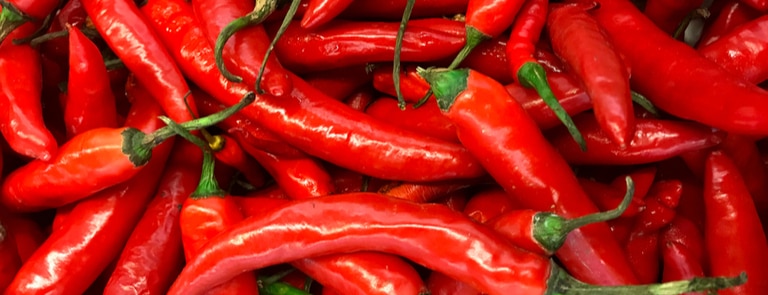15% off €35 OR 20% off €45
Health benefits of chillies

Whether you enjoy a spicy curry or prefer a peppery hot sauce, chillies are among the world’s most popular flavourings. In the United Kingdom, chilli peppers have become increasingly popular over the last ten years, with heatseekers favouring their fiery taste.1
While there are over 4,000 types of chillies globally, we tend to eat the fruit of the capsicum annuum plants.2 With a range of different spicy flavours and a variety of heat levels, there’s no doubt that chillies bring plenty of flavour and zing to our culinary endeavours.
But are chillies good for you? And what are the health benefits of including them in your diet? We’ve got everything you need to know below.
What are chillies?
Chilli peppers (or capsicum) are members of the nightshade family. They’re relatives of the tomato, aubergine, and bell pepper. Varieties of chillies are grown across the world, although they’re most commonly grown in warm climates.3
There are varying levels of spiciness for different chilli varieties too. These are measured on the Scoville Scale, which identifies how spicy a particular chilli species is likely to be. For example, jalapeno peppers are around 4,000 units, while habanero peppers are measured at 350,000.4
Health benefits of chillies
While chillies are a tasty addition to many of our favourite recipes, condiments, and seasonings, they might be a healthy addition to your diet too.
Chillies’ nutritional profile contains vitamin C, B, K and A. Chillies are also a copper and potassium source. However, it’s worth bearing in mind that we tend to eat chillies in small amounts, which means their contribution to our overall nutritional needs might be slim.5
There are some health benefits associated with eating chillies. These may include:
- Heartburn relief6
- Weight loss7
- Reduced appetite8
However, it’s unlikely that eating chilli peppers will help solve health concerns on their own. It’s always worth talking to your doctor if you have any specific health concerns.
Potential risks of eating chillies
Chillies are prized for their spicy flavour. However, that heat can have its downsides. Eating too many chillies could cause intense pain, swelling, and redness.9 These hot peppers may also cause digestive problems, like nausea, diarrhoea, and cramps.10
If you have a digestive disorder, it may be worth avoiding very spicy chillies and other hot foods to prevent exacerbating the condition.
How to include more chillies in your diet
Chillies are an incredibly versatile ingredient, and you’ll find different varieties in different forms on the supermarket shelves. From fresh and preserved chillies to powdered and dried chillies, there’s plenty to choose from. You can also find processed chilli products, like jams, sauces, and condiments.
Many dishes lend themselves well to an injection of chilli seasoning. Many traditional cuisines, like Indian, Thai, or Caribbean, include chillies in the recipe list. Or, experiment with adding chilli seasoning to your favourite plates of pasta, casseroles, or stews.11
Last updated: 13 April 2021
- https://www.theguardian.com/lifeandstyle/2015/sep/09/how-britain-has-gone-crazy-for-chillies
- https://chili-plant.com/chilli-varieties/
- https://www.britannica.com/plant/chili-pepper
- https://www.britannica.com/video/186956/science-heat-flavour-Sriracha-sauce
- https://pubmed.ncbi.nlm.nih.gov/24345983/
- https://pubmed.ncbi.nlm.nih.gov/11907302/
- https://pubmed.ncbi.nlm.nih.gov/24246368/
- https://pubmed.ncbi.nlm.nih.gov/21093467/
- https://pubmed.ncbi.nlm.nih.gov/8888888/
- https://pubmed.ncbi.nlm.nih.gov/12809862/
- https://www.bbc.co.uk/food/chilli



